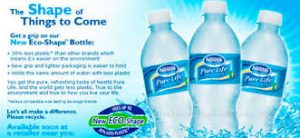
Image From: http://www.professionalcleaning.org/eco-cleaning/environmental-claims
Buying products marked “green” or “eco-friendly” may promote our culture’s emphasis on environmental sustainability, ensuring demands placed on the environment do not surpass what it is capable of fulfilling for present and future generations, as a value. However, the result of purchasing based on environmental claims is often the opposite of an individual’s intent.

Image From: http://www.sustainableisgood.com/blog/2007/08/poland-spring-o.html
Environmental claims for products are not actively regulated, instead the Federal Trade Commission (FTC) produced the “Green Guidelines” which designates what claims are appropriate for, versus deceptive to, the consumer. The FTC has the power to issue warnings and fines to companies who violate the guidelines, yet these guidelines are not strong and only deal with how the product’s background is presented, rather than setting expectations for production. Thus, companies can work within the guidelines to advertise goods as environmentally superior, even when their production process is not favorable to the planet. For instance, Nestle uses claims about recycling and reduction to make their plastic water bottles seem environmentally-conscious; in reality, using disposable plastic bottles is harmful and reusable water bottles are the more sustainable option.
In the case shoppers identify the truly low-impact products, they often negate the potential good of that decision by purchasing or employing more than necessary because they feel better about the previous good decision. This tendency is known as Jevon’s Paradox or “moral licensing.” I understand this in terms of my tendency to give into cravings on days I exercise: “I ran today, so it’s okay to have this donut.” A Swedish study in 2013 found people were not only more willing to pay more for a coffee labeled as “eco-friendly,” but also more inclined to think it tastes better and purchase more. Similarly, Prius drivers drive more than non-hybrid vehicle users because the Prius is advertised as less impactful on the environment.

Image From: http://www.greendirectory.co.nz/Packaging/Eco-Friendly-Packaging
In summary, due to consumer propensity for moral licensing and the FTC’s lackadaisical guidelines, consumption of proclaimed “environmentally-conscious” goods does not bring us closer to a healthy planet, but can set us back.
- “Green Guides.” Federal Trade Commission, Federal Trade Commission, 12 Dec. 2017, www.ftc.gov/news-events/media-resources/truth-advertising/green-guides.
2. Hedblom, Daniel, et al. “Who Needs Cream and Sugar When There Is Eco-Labeling? Taste and Willingness to Pay for âEco-Friendlyâ Coffee.” PLoS ONE, vol. 8, no. 12, 2013. National Institution of Health, doi:10.1371/journal.pone.0080719.
3. Dubeau, Matthieu. “Linking Person, Planet, and Politics.” POL S/ENVIR 385. Lecture #4, 7 Apr. 2018, Seattle, University of Washington, Seattle.
